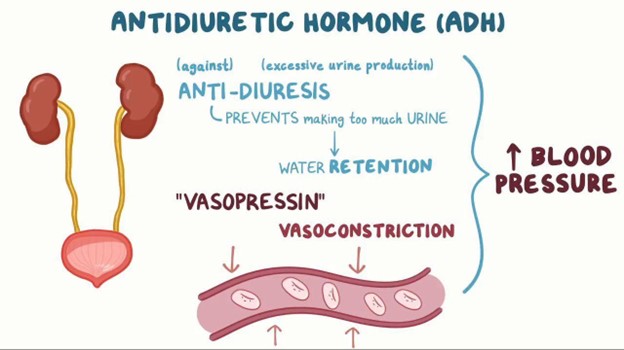A nurse is reviewing data for a client who has a head injury. Which of the following findings should indicate to the nurse that the client might have diabetes insipidus?
Urine output 800 mL/hr
Blood glucose 198 mg/dL
Serum sodium 145 mEq/L
Urine specific gravity 1.028
The Correct Answer is A
Choice A Reason: Urine output 800 mL/hr is a sign of diabetes insipidus, as it indicates that the kidneys are producing large amounts of diluted urine due to the lack of antidiuretic hormone (ADH) or its action.
Choice B Reason: Blood glucose 198 mg/dL is not a sign of diabetes insipidus, but it may indicate diabetes mellitus or hyperglycemia.
Choice C Reason: Serum sodium 145 mEq/L is not a sign of diabetes insipidus, but it is within the normal range (135-145 mEq/L).
Choice D Reason: Urine specific gravity 1.028 is not a sign of diabetes insipidus, but it indicates concentrated urine due to dehydration or other causes.

Nursing Test Bank
Naxlex Comprehensive Predictor Exams
Related Questions
Correct Answer is A
Explanation
Choice A Reason: Keeping scissors at the bedside is the most important safety intervention for this client, as it allows for quick removal of the tube in case of airway obstruction or bleeding.
Choice B Reason: Providing good mouth care is an important intervention for this client, but it is not the most important, as it helps to prevent oral infections and discomfort.
Choice C Reason: Deflating the balloon on a regular basis is not an appropriate intervention for this client, as it may cause bleeding or displacement of the tube.
Choice D Reason: Monitoring IV fluid intake is an important intervention for this client, but it is not the most important, as it helps to prevent fluid overload or dehydration.
Correct Answer is C
Explanation
Choice A Reason: Cold skin is not a common finding in hyperthyroidism, but it may indicate hypothyroidism or other conditions such as hypothermia or shock.
Choice B Reason: Weight gain is not a common finding in hyperthyroidism, but it may indicate hypothyroidism or other conditions such as Cushing's syndrome or edema.
Choice C Reason: Tachycardia is a common finding in hyperthyroidism, as the increased thyroid hormone level causes the heart rate and cardiac output to increase.
Choice D Reason: Anorexia is not a common finding in hyperthyroidism, but it may indicate other conditions such as depression, infection, or cancer.
Whether you are a student looking to ace your exams or a practicing nurse seeking to enhance your expertise , our nursing education contents will empower you with the confidence and competence to make a difference in the lives of patients and become a respected leader in the healthcare field.
Visit Naxlex, invest in your future and unlock endless possibilities with our unparalleled nursing education contents today
Report Wrong Answer on the Current Question
Do you disagree with the answer? If yes, what is your expected answer? Explain.
Kindly be descriptive with the issue you are facing.
